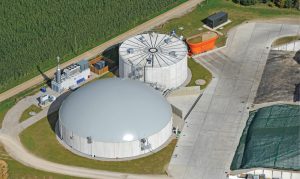The state of the AD industry in the United Kingdom is dynamic but the potential for further growth is huge, according to the Anaerobic Digestion and Bioresources Association.
Charlotte Morton
BioCycle May 2015

Over 90 food waste AD facilities are in operation in the United Kingdom, such as the one near Bridgwater, England (shown above during construction), with many more in the pipeline.
In the last five years the United Kingdom’s anaerobic digestion (AD) industry has seen 622 percent growth outside of the water sector — and energy generation from sewage gas has increased by over a quarter in the same time period. With about 100 new AD plants having opened last year across all sectors, including water, the industry now has an electrical equivalent capacity (electricity and biomethane) across all sectors of over 456 MW at 396 plants — almost identical to one of the UK’s nuclear power plants, Wyfla, which is being decommissioned this year.
All of this progress reflects a dynamic industry that has benefitted from relatively stable government policy, which could be impacted by the UK General Election on May 7. Some political party platforms offer vital green policy pledges, such as investment support, a ban on food waste to landfill and targets to decarbonize the UK’s electrical supply. Other parties, however, are not offering any meaningful green policies. The primary issue for the AD industry surrounds uncertainty on crucial government incentives beyond the middle of 2016. Nevertheless, the Anaerobic Digestion and Bioresources Association (ADBA) believes the potential for further growth is still huge. The UK AD industry currently generates around 7 TWh (terawatt hours; 1 TW = 1 million MW), enough green gas to heat half the homes in central London, but the industry could be generating in excess of 80 TWh. This would be equivalent to about 30 percent of the UK’s domestic gas demand. At a time when energy security is high on the political agenda, this is valuable, not least because biogas is storable, dispatchable and flexible.
A shift in the political landscape has the potential to offer exciting new market prospects for the green agenda and AD’s role. Energy is just the start of what AD can deliver. The industry could also create 35,000 green jobs and contribute about £3 billion ($4.6 billion) to the UK economy. In addition, it could produce nutrient rich biofertilizer worth around £200 million ($309 million) a year to UK farmers, improving food security and production. And overall, AD could reduce the UK’s total greenhouse gas emissions by a whopping two percent. AD is constantly evolving, adapting technology that is always driving hard to reduce costs, increase outputs, cut carbon footprints, and develop new, innovative high-value products. This year’s UK AD & Biogas 2015, which ADBA will be hosting at the NEC in Birmingham on July 1-2 (see sidebar), will showcase the latest technology and services from the AD industry, and new innovations that could more than triple the industry’s current potential to deliver 30 percent of the UK’s domestic gas demand.

The number of agricultural AD plants has doubled to 139 in the last year. The Spring Farm AD facility is shown above.
Trends And Accomplishments
Food Waste AD: Over 91 food waste AD facilities are in operation in the UK, with many more in the pipeline. By recycling inedible food waste through AD, the industry could produce 9.3 TWh/year from food waste alone by 2025. Participants at UK AD & Biogas 2015 will have an opportunity to tour the recently opened Severn Trent Green Power’s £13 million ($20.1 million) plant located at the Coleshill sewage treatment works. The food waste digester receives feedstocks (packaged and unpackaged) from food and drink manufacturers and food processing companies; hospitality and food service (pubs, cafes, restaurants and hotels); local authorities (segregated household collections); schools, colleges, universities and hospitals; and supermarkets and retail stores. Around 17,000 MWh of electricity are generated, sufficient to power around 4,000 homes or the entire sewage treatment works site at which the plant is located.
Biogas To Vehicle Fuel: There are now around 30 biomethane plants in operation in the UK. Use of biomethane as a vehicle fuel has grown, with evidence from the Gas Vehicle Hub demonstrating that the number of UK gas refuelling points which supply biomethane content has doubled year on year for the past three years to 11. This is a market with significant potential in the UK: there is clear demand from fleet operators, and the European Commission recently outlined a new regulatory framework that could require Member States to ensure publicly accessible refuelling points every 400 km (about 250 miles) by the end of 2025.
Currently, conventional biofuels such as bioethanol and biodiesel account for the majority of biofuels supplied and used in the UK. Under existing policies, however, the UK has a ways to go to being able to meet the Renewable Energy Directive’s (RED) 10 percent renewable transport fuel 2020 target. Progress is hampered by continuing debate around Indirect Land Use Change (ILUC) and the use of crops for biofuels. Current low gas and oil prices, together with the likelihood of a European Union move towards a greenhouse gas abatement target post-2020, mean serious consideration should be given as to whether alternative fuels can be scaled up moving forward. ADBA is actively working with the Department for Transport (DfT) to examine what role biomethane can play, both in helping to meet the 2020 RED target, and also a possible post-2020 greenhouse gas abatement target.
Farm AD: There has been a substantial increase in the number of new plants being commissioned in the agricultural sector, where British farmers could still potentially power an additional 1.3 million homes by entering the renewable energy market. More farmers — and their funders — are recognizing that AD can be an effective technology for managing manures and slurries, as well as generating renewable energy. The number of agricultural AD plants has doubled to 139 in the last year. That’s progress, but the National Farmers Union estimates that there could be as many as 1,000 on-farm AD plants in the UK by 2020.
Smart Cities Technology: An important topic at UK AD & Biogas 2015 is how the UK AD industry can expand over the next five years. That discussion will consider the central role that AD can perform at the heart of future city designs. AD has been ranked among the top ten vital renewable technologies for smart cities in a report, “Smarter, Greener Cities,” published last month by the UK government’s Green Investment Bank. As one of the few circular economy technologies already functioning, AD will be a vital recycling and renewable energy technology to underpin cities of the future — and there are opportunities for the UK to take a leading role in resource-efficient urban design.
The anaerobic digestion sector’s development over the last five years is something that the industry should be rightly proud of, but it is the next five year period which will test the industry’s ability to reach its potential. This ambition can only be achieved if government policy recognizes the full range of benefits from an industry at the heart of the circular economy: reducing waste, generating domestic renewable energy, and supporting sustainable farming and food production.
Charlotte Morton is Chief Executive of the Anaerobic Digestion & Bioresources Association (ADBA), where she helped set up the business side of ADBA in 2009. She is also on the board of Green Gas Trading Limited, which runs the Biomethane Certification Scheme. To learn more, visit www. adbioresources.org.
Correction: May 15, 2015
Values representing updated data replaced original values












